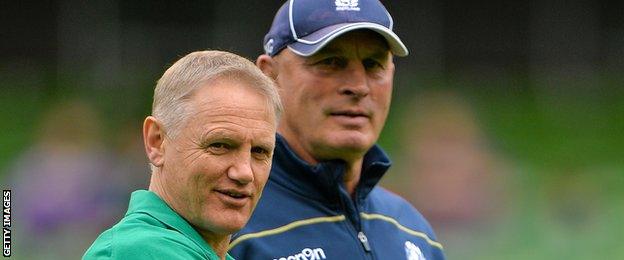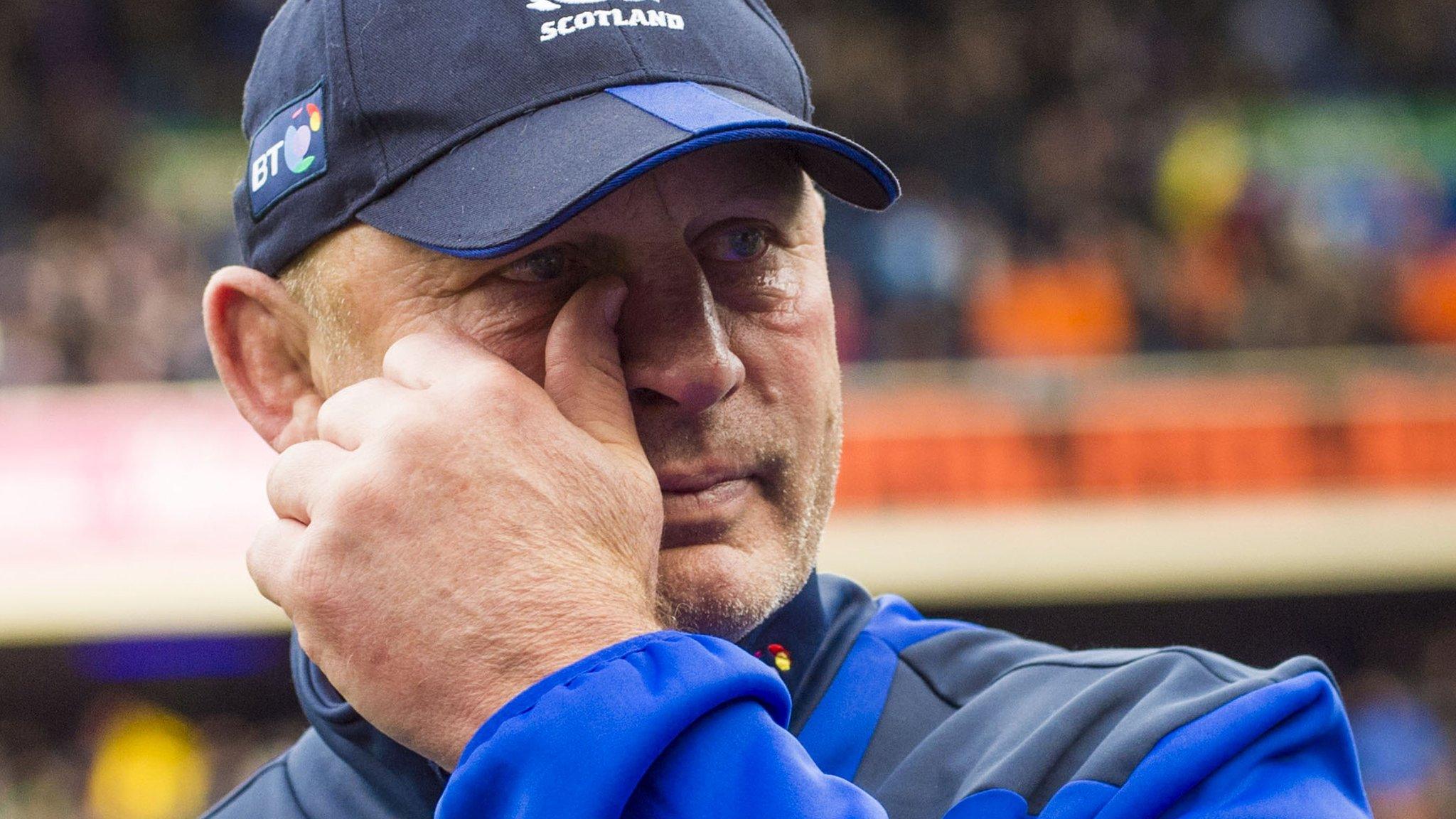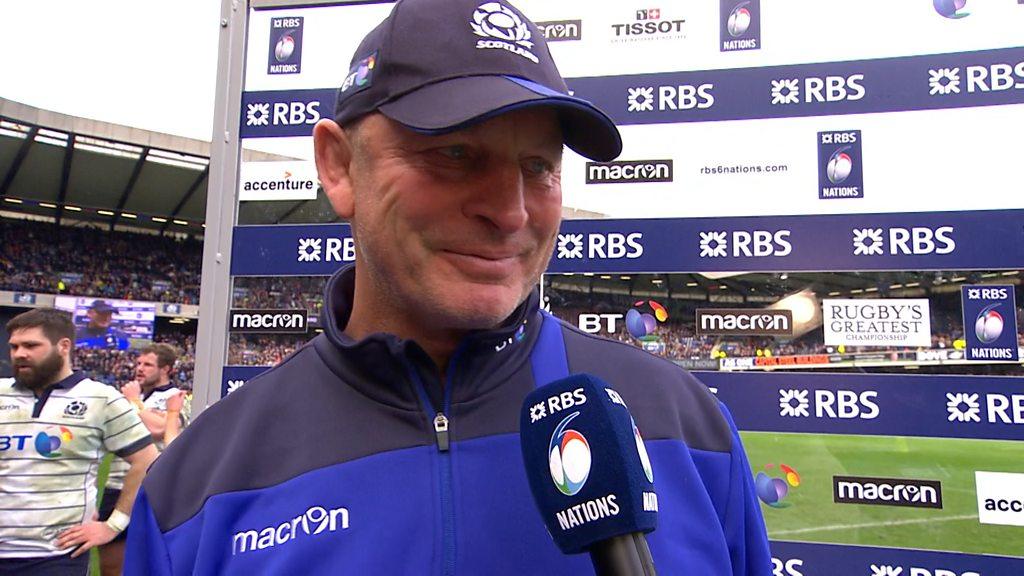Vern Cotter: Scotland coach departs 'heroically deadpan, a tour-de-force of sternness'
- Published
Six Nations 2017: Emotional Murrayfield farewell for Vern Cotter
He didn't quite crack, but Stern Vern wasn't so firm out there in the middle on the full-time whistle.
As he took to the microphone against a backdrop of Murrayfield emptying its appreciation on top of his head, les yeux de glace - the 'eyes of ice' - were beginning to melt. He took one question and was gone. Two questions might have been too much even for one as tough as him.
It was, in truth, an extraordinary end-game for Vern Cotter. Not the match - a solid but unspectacular bonus-point victory - but the aftermath of the match, the way the crowd responded to him. He had to be coaxed into walking around the pitch with his players. From the back of the west stand his discomfort was clear when the man on the PA system piped up: 'Let's hear it for Big Vern!'
He hung around the back of the procession as a reluctant, and slightly embarrassed, participant but these moments would have been special to him. No question.
He spoke about it later. Said it was a privilege to be in this job for three years. Said it was a lovely way to sign off, strolling around the stadium with his Saltire-waving daughter at his side, sure in the knowledge that no matter what results the later kick-offs brought, this was a season that brought respectability and hope back to the national team after pretty much 17 years of cowering behind the couch.

Cotter is the only Scotland coach in the professional era with a win percentage above 50%
This wasn't the way Scott Johnson bowed out or the way Andy Robinson left or the way Frank Hadden departed. It was a different galaxy compared to the last day of Matt Williams, which, let's face it, was a national day of celebration for anybody who cared about the fortunes of the team.
It's worth remembering what it was like this time three years ago. The 2014 championship was the last before Cotter arrived - and it was grim. Scotland won one game, in the 79th minute in Rome, and lost the other four. It wouldn't have been so miserable had the other four been contests, but they weren't.
Ireland had the game won before the hour-mark. France won late on despite having precious little ball and Wales won 51-3 after Stuart Hogg was shown the red card. Scotland scored a mere 47 points in five games. They scored just four tries. Their points difference was minus 91. They were international no-marks. Disregarded also-rans. They ranked 10 in the world but now they rank fifth.
Scotland in Six Nations - last four years (last three under Cotter) | |||
|---|---|---|---|
Year | Record | Points | Tries |
2017 | W 3 L 2 | F 122 A 118 | 14 |
2016 | W 2 L 3 | F 122 A 115 | 11 |
2015 | W 0 L 5 | F 73 A 128 | 6 |
2014 | W 1 L 4 | F 47 A 138 | 4 |
As Twickenham illustrated in horrendous technicolour, they still have a way to go, but a lot has changed on Cotter's watch and that's why he got such an ovation on Saturday.
We've all been around the block in the rugby world and it's hard to remember an international coach bowing out the way Cotter bowed out. Normally, they slip out the back door, unwanted and out of time. This was unique. This was a coach being love-bombed out the door, everybody clapping and cheering and asking each other, 'Why's he leaving? What did we do wrong?'
Why's he leaving? Well, he doesn't want to, that's for sure. He wanted to stay, wanted to keep building, wanted to immerse himself further in the project. Circumstance intervened. The SRU feared - and they were right to fear - that Gregor Townsend, the country's one world-class homegrown coach, was going to be lost to England or France and the aesthetic of seeing him vanish with an unknown return date was something they couldn't tolerate.
Cotter was a victim of that, not that he sees himself that way. He knows the way of the world. He accepted it and moved on. Sport doesn't tend to do amicable divorces. It doesn't do classy departures, but this was one. And even though the final-day drama of this Six Nations Championship lay in the 'Mousetrap', external Test in Paris and the great ambush in Dublin, the scenes in Murrayfield were wonderful.
If you could have been at the press conference, it was priceless. There we were, trying to press Cotter's buttons, trying to bring him to a profound place where he would tear-up a little as he recounted his odyssey in Scotland. He gave a little, but not a lot. For the most part he was heroically deadpan, a tour-de-force of sternness.
He wanted to keep it real, he wanted to talk about the Test against Italy, how it wasn't perfect, but how he admired his players' maturity in working through the tough spots and getting the result they needed. He was asked about legacy, but he wasn't going there. At a guess, he'd have thought it cringe-making to talk about himself in this scenario.
Cotter's great strength as a rugby coach is in building a culture, not in talking about building a culture. He does it and doesn't see the point in revelling in it. He's a rugby man, not a show man. Scotland's loss is Montpellier's gain.
Joe Schmidt is a go-to man for insight on Cotter. The Ireland coach, and fellow Kiwi, is a great mate of Cotter's. Theirs is a friendship forged in the French championship at Clermont, where they worked and worked and worked and finally succeeded and won the league title for the first time in the club's history.

Joe Schmidt and Cotter forged a close bond during their days with Clermont Auvergne
Cotter was head coach, Schmidt was his assistant. Bearing in mind that Schmidt is generally considered Ireland's greatest ever national coach, these are the kinds of things he says about his old mate.
"I learned so many things from him, just about being decisive, just about trying to grow the key leaders. I just found that he had a real ability to crystallise messages and deliver them. That rugby intellect was something else. It's probably hard to specify and quantify because a lot of it is almost by osmosis. You pick things up and you probably don't specifically say, 'Oh, I learned that today'. I absorbed a lot from VC."
These Scotland players would know the truth of Schmidt's message. They absorbed a lot, too. At the news conference, there were further attempts to tempt him out of his shell and spill the beans about what it all meant to him. He kept it to praise of the players and appreciation of the chance he'd been given in working with them.
Then he was away, through the door, down the corridor, into the changing room and back to a group of players who will probably spend the rest of their careers repeating that line from Joe Schmidt: "I absorbed a lot from VC."
- Published18 March 2017

- Published18 March 2017

- Published18 March 2017

- Published18 March 2017

- Published25 January 2017